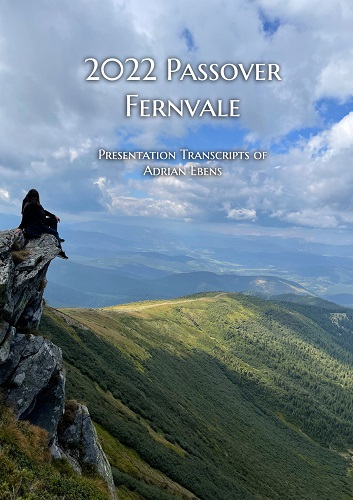Christ's Life a Testimony to His Divine Claims
by Ellen G. White, Advent Review and Sabbath Herald July 7, 1896
All the world are invited to come to the gospel feast. Jesus has called all sinners to himself. "Many are called, but few are chosen." The voice of entreaty comes to the careless and the impenitent, saying, "Turn ye, turn ye from your evil ways; for why will ye die?" The Lord has sent forth his entreating invitation. It is the same invitation that he gave to the Samaritan woman while seated upon Jacob's well. Jesus said to her: "If thou knewest the gift of God, and who it is that saith to thee, Give me to drink; thou wouldest have asked of him, and he would have given thee living water. . . . Whosoever drinketh of the water that I shall give him shall never thirst; but the water that I shall give him shall be in him a well of water springing up into everlasting life."
When Jesus spoke to the woman of Samaria, he was not presenting the gospel invitation to her alone, but to the thousands upon thousands who should read his words. Jesus traveled up and down the breadth of the land, giving his invitation to the feast. When the sun illuminated the landscape, Jesus said to the vast throng: "I am the light of the world: he that followeth me shall not walk in darkness, but shall have the light of life." He took the opportunity of presenting himself to the people during the feast-days, when they gathered at Jerusalem. The people met together to carry out the instructions given to Moses, to "observe the feast of tabernacles seven days, after that thou hast gathered in thy corn and thy wine;" and Jesus himself stood in the midst of them. The feast of tabernacles was the great holiday of the nation. This feast was preceded by a day of atonement, which occurred on the tenth day of the seventh month, when every one was to afflict his soul by confessing his sins, both to the Lord and to his brethren. This humiliation was to prepare the way for the celebration of the feast of tabernacles, which lasted seven days, and was a memorial of the protecting care of God when he led Israel through the wilderness. In the instruction to Moses, he said: "Also in the fifteenth day of the seventh month, when ye have gathered in the fruit of the land, ye shall keep a feast unto the Lord seven days: on the first day shall be a sabbath, and on the eighth day shall be a sabbath. And ye shall take you on the first day the boughs of goodly trees, branches of palm-trees, and the boughs of thick trees, and willows of the brook; and ye shall rejoice before the Lord your God seven days. And ye shall keep it a feast unto the Lord seven days in the year. It shall be a statute forever in your generations: ye shall celebrate it in the seventh month. Ye shall dwell in booths seven days; all that are Israelites born shall dwell in booths: that your generations may know that I made the children of Israel to dwell in booths, when I brought them out of the land of Egypt: I am the Lord your God." It was to the celebration of this feast that Jesus came. The Scripture says: "But when his brethren were gone up, then went he also up unto the feast, not openly, but as it were in secret. Then the Jews sought him at the feast, and said, Where is he? And there was much murmuring among the people concerning him: for some said, He is a good man: others said, Nay; but he deceiveth the people. Howbeit no man spake openly of him for fear of the Jews." "Nevertheless among the chief rulers also many believed of him; but because of the Pharisees they did not confess him, lest they should be put out of the Synagogue: for they loved the praise of men more than the praise of God."
They concealed their true convictions for fear of persecution. They dared not express their true feelings and faith. Many were convinced that he was the Messiah, long looked for and greatly desired, yet they dared not express their convictions. There was dissension among the people concerning him. Some denounced him as a deceiver, while some ventured to express their favor toward him, saying that he was a good man. But this was as far as they ventured to go. They had not moral courage in the face of the denunciations uttered against him to say, I believe him to be the world's Redeemer. They dared not give utterance to the conviction that he was the divine Son of God, and that they were dependent on him alone for salvation. Many were silent, and uttered no opinion concerning him; and even some of the chief rulers who believed in him did not confess him. It was about the midst of the feast when Jesus went up to the temple and taught. "And the Jews marveled, saying, How knoweth this man letters, having never learned?" He spoke with assurance, and revealed a depth of knowledge far exceeding that of the most learned of the Scribes and rabbis. It was evident that he had a thorough knowledge of the Old Testament Scriptures, and that he presented truth that was unmingled with the sayings and maxims of men. The old truths fell upon their ears like a new revelation. The people had never before heard the gospel of the Old Testament presented with such simplicity and fervor, spoken with a voice so full of melody and tenderness. They were thrilled to the very depths of their souls, and they marveled at his wisdom. Jesus read the question in their hearts, and answered the suggestions of their thoughts. He said: "My doctrine is not mine, but his that sent me. If any man will do his will, he shall know of the doctrine, whether it be of God, or whether I speak of myself.
Jesus presented his lessons to the people; but he did not make a practise of asserting his high and authoritative claim. He had come to save the lost world, and his words and works, his whole life in humanity, was to speak of his divinity. He left it to his own dignity, to his life, to his course of action, to witness to the people that he worked the works of God. He left it to them to draw their own conclusion concerning his claims, while he expounded to them the prophecies concerning himself. He directed them to search the Scriptures; for it was essential that they should interpret correctly the mission and work of the Son of God. He pointed out the fact to them that he was fulfilling the prophecies that had hitherto been given by holy men who were moved upon by the Holy Spirit. He declared plainly that they wrote of him, and brought the clear rays of the light of prophecy to illuminate his words and works. Conviction fastened upon the minds of his hearers, and in their minds and affections they wove a crown of glory for his head. He stood forth in his ministry as one distinguished from every other teacher. He himself had inspired the prophets to write of him. His life work had been planned in the eternal counsels of heaven before the foundation of the world. He was the light of the world, yet he was meek and lowly in heart and character. His life was the light of men, and he presented his life before the people, that their faith might lay hold upon it, and that they might become one with him.
Though he presented infinite truth, he left many things unsaid that he might have said, because even his disciples were not able to comprehend them. He said, "I have yet many things to say unto you, but ye cannot bear them now." The burden of his teaching was obedience to the commandments of God, that would work transformation of character and inculcate moral excellence, shaping the soul after the divine similitude. Christ had been sent to earth to represent God in character. Jesus was the Life giver, the Teacher sent of God to provide salvation for a lost world, and to save men in spite of all Satan's temptations and lying deceptions. He himself was the gospel. In his teachings he clearly presented the great plan devised for the redemption of the race. Divinity had united with humanity for the purpose of uniting humanity with divinity, that through Christ man might become a partaker of the divine nature. "God so loved the world, that he gave his only begotten Son, that whosoever believeth in him should not perish, but have everlasting life."
The sayings of the Lord Jesus Christ are of value beyond all computation. Those who casually read them do not comprehend their depths of meaning. They are life and light, and upon their reception depends the soul's salvation. They are truth and righteousness, and are to be carefully studied and practiced. But the sayings of Christ are not a new revelation. The principles which he expounded were announced to Moses from the pillar of cloud, and to the prophets, who spoke and wrote as they were moved upon by the Holy Spirit. But the Jews had departed from the light and the grace that had been given them, and had not practised the sacred teachings that were essential for their present, spiritual help and for their eternal interests. Because of this, the words of Christ fell upon the ears of the Jewish nation as a new revelation. They were like blind men whose eyes were opened to behold wonderful things; their hearts burned within them as he opened the Scriptures to them. Although he had not been known as a student in any of their schools, Christ told them that he had not been untaught and uneducated. He taught that which he had learned of God. He said, "My doctrine is not mine, but his that sent me. If any man will do his will [he will not remain in ignorance], he shall know of the doctrine, whether it be of God, or whether I speak of myself."
He who fully purposes is his heart to do the will of God, at whatever self-denial or self-sacrifice, will certainly know the truth through his own experience. Those who will obey God's commandments, and not deviate from the precepts of Heaven, will enter into life. To will to do the will of God, is to yield the whole mind and affections to the control of God. Such a one will know of the doctrine, not be in questioning and doubt, not be halting between two opinions; for he will be willing to submit all to God, realizing that he has purchased all. It is when we give ourselves to Christ, to do his will, that we realize the truth of the saying of David, "The entrance of thy words giveth light; it giveth understanding unto the simple." It is then that reason and conscience are fully in harmony with the will of God, and there is no collision between the truth of God and the soul.
The doctrines that Christ taught are essential for the salvation of the soul; for perfection of character is the result of willing obedience to the truth as it is in Jesus. This is the faith that works by love and purifies the soul. It is self-exaltation that results in the rejection of Christ, and this proved the ruin of the Jews. They felt no need of a Saviour, they realized no weakness, they desired no plan of atonement. For many years they had been going through a round of service which had been instituted by Christ, and which typified Christ, yet when the Messiah walked among them in the habiliments of humanity, offering them his grace and pardoning mercy if they would forsake their sins and turn unto God, they did not discern him. Many were loaded with deception and hypocrisy. When the Pharisees and the Sadducees came to the baptism of John, he exclaimed: "O generation of vipers, who hath warned you to flee from the wrath to come? Bring forth therefore fruits meet for repentance: and think not to say within yourselves, We have Abraham to our father: for I say unto you, that God is able of these stones to raise up children unto Abraham." He presented to the Jewish leaders the fact that they must be transformed in character. He said to Nicodemus: "Verily, verily, I say unto thee, Except a man be born again, he cannot see the kingdom of God. . . . Except a man be born of water and of the Spirit, he cannot enter into the kingdom of God."
If the Jewish nation had accepted the light that Christ brought to them, it would have revealed to them their need of a Saviour, their need of atonement, their need of the purifying, pardoning love of God. It would have revealed to them the significance of the atonement which they had been celebrating, and fitted them to enjoy the feast of tabernacles and to rejoice before the Lord. They would have realized that God does not require simply a portion of the heart; but that acceptable service to himself means the consecration of heart, mind, soul, and strength. In explaining his teaching to them, Jesus said, "He that speaketh of himself seeketh his own glory: but he that seeketh his glory that sent him, the same is true, and no unrighteousness is in him." He who speaks by his own authority, who presents a message that does not come from God, is only a human teacher, liable to be seduced by the deceptions of the enemy; he seeks but the praise of men, the exaltation of himself; but he who is sent of God, as was Christ, is true, and no unrighteousness is in him. The common people heard him gladly, and many testified, "Never man spake like this man."





